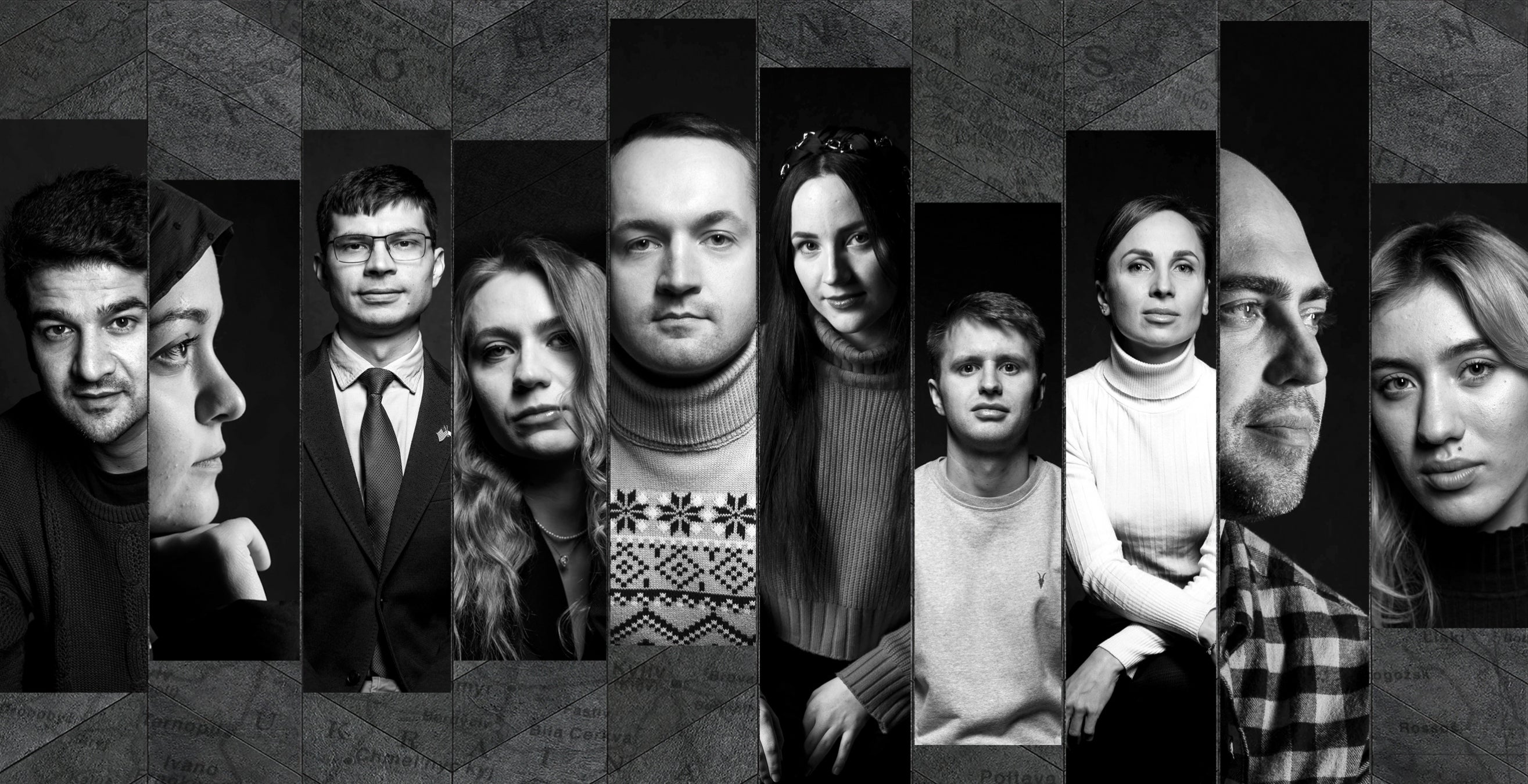Long gone are the days when war was waged — and peace was forged — on the battlefield alone. Today, conflicts like the Russia-Ukraine war or the Taliban takeover of Afghanistan may still be fought with guns and bombs, but efforts to stem the violence, help its victims and rebuild nations are unfolding in courtrooms and boardrooms, at international forums and in lawmakers’ halls. Countries in crisis need leaders who can operate in these spaces and who will work toward the highest ideals of the law.
That understanding was key to the creation of the Center for International Legal Education (CILE) at the University of Pittsburgh’s School of Law. Since Ronald Brand, Chancellor Mark A. Nordenberg University Professor, became the founding director of the center in 1995, it has been preparing students — some of whom come from conflict zones — for careers in global law.
“Our alums become community leaders and policymakers advancing human rights in places like Syria and Kosovo,” says Charles Kotuby, a professor of practice in Pitt’s School of Law and executive director of the CILE. The center’s mission, he notes, is in keeping with the greatest ambitions of international law.
“As lawyers, we are drawn to injustice — or we should be,” he said in a recent address to the Pitt Law community. “We are drawn to conflict — or should be. Metaphorically, we are trained to run toward the sound of the guns. We are bridge builders, so we have to go where the rivers are.”
The center was involved in providing legal education in Afghanistan and Ukraine long before the recent turmoil. One of the CILE’s first international partnerships was with Donetsk National University Faculty of Law in Eastern Ukraine. The center has also been working with more than a dozen Afghan law schools to train faculty and students since 2015.
Last year, the CILE created a new way to support bright legal minds from these countries: the Rule of Law Fellowship. Sponsored by 10 local and international firms, foundations and companies, the fellowship provides tuition and living expenses to deserving Afghan and Ukrainian lawyers pursuing an LLM, or specialized master’s degree in law, from Pitt’s School of Law.
This year’s cohort includes 11 ambitious legal professionals. Their studies, internships and the pro bono work they undertake are equipping them with further knowledge in subjects like international arbitration, commercial law, anti-corruption and human rights — skills that will benefit their communities back home. And while each fellow has their own background and legal aspirations, they all share the challenging commonality of being forced to leave their homes in pursuit of a brighter future for themselves and others.
“We founded the Rule of Law Fellowship to give these remarkable students an escape from the current conflict; to grant them the opportunity to learn from the faculty at Pitt Law; to allow them to participate in advocacy, scholarship and international pro bono matters that shine a light on the conflicts in their home countries; and to prepare them to lead those countries in the future,” says Kotuby.
For members of this cohort, pursuing an advanced law degree is an act of faith — faith in the power of the law to spur societal change, faith in the influence of democracy to steady struggling nations, and faith in themselves to obtain the tools and knowledge needed to make life better for those they left behind.
“These students have a burning desire to be change agents in reclaiming the future of their respective countries,” says Kotuby. “Their time with us is an integral part in their ability to do so.”
Meet 10 members of the inaugural class of Pitt’s Rule of Law Fellowship program.
Mohammad Nazeer Mayar — Baghlan, Afghanistan
Olha Tsyliuryk — Bucha district, Ukraine
Tymur Mykhailov — Donetsk, Ukraine
Anastasiia Rozvadovska — Kyiv, Ukraine
Yaroslav Petrenko — Kyiv, Ukraine
Maryam Jami — Herat, Afghanistan
Tetiana Borysenko — Kyiv, Ukraine
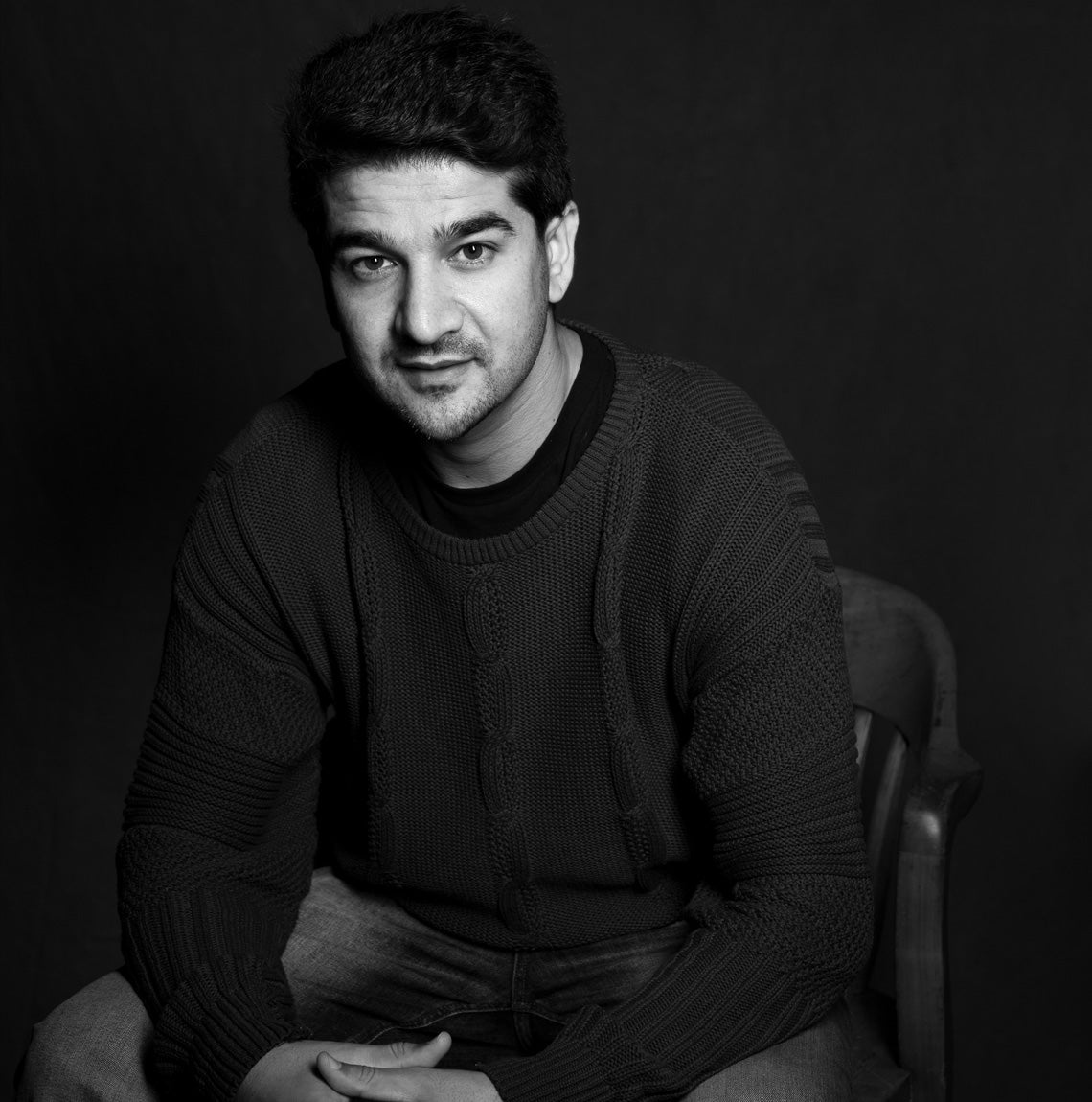
Mohammad Nazeer Mayar
Baghlan, Afghanistan
He grew up in the northern part of Afghanistan’s Baghlan province, an area partially governed by Pashtuns, a socially conservative ethnic group. The girls and women in Mohammad Nazeer Mayar’s community — including his mother, who once dreamed of becoming a doctor — were banned from pursuing education. As a young man disturbed by the injustices around him, he taught girls from his village in his family's kitchen using chalk he swiped from school. The experience spurred him to pursue a law degree in hopes of one day facilitating change.
When the Taliban regained control of Afghanistan in 2021, Mayar was working as a spokesperson for the Baghlan governor’s office in the former republican government of Afghanistan. The new regime soon labeled him an enemy, and he spent months in hiding before attaining a visa and leaving for the United States.
He is uncertain if or when he will be able to return to Afghanistan. In the meantime, he plans to use what he is learning at Pitt to represent his country’s interests in international courts.
Law school is the place where you learn how to bring changes in society — not with force, but at the policy level. My dream is to work for democracy, women’s rights, gender equality and rule of law in Afghanistan — to one day see it free of violence, where men and women can live together without the fear of execution and interrogations.
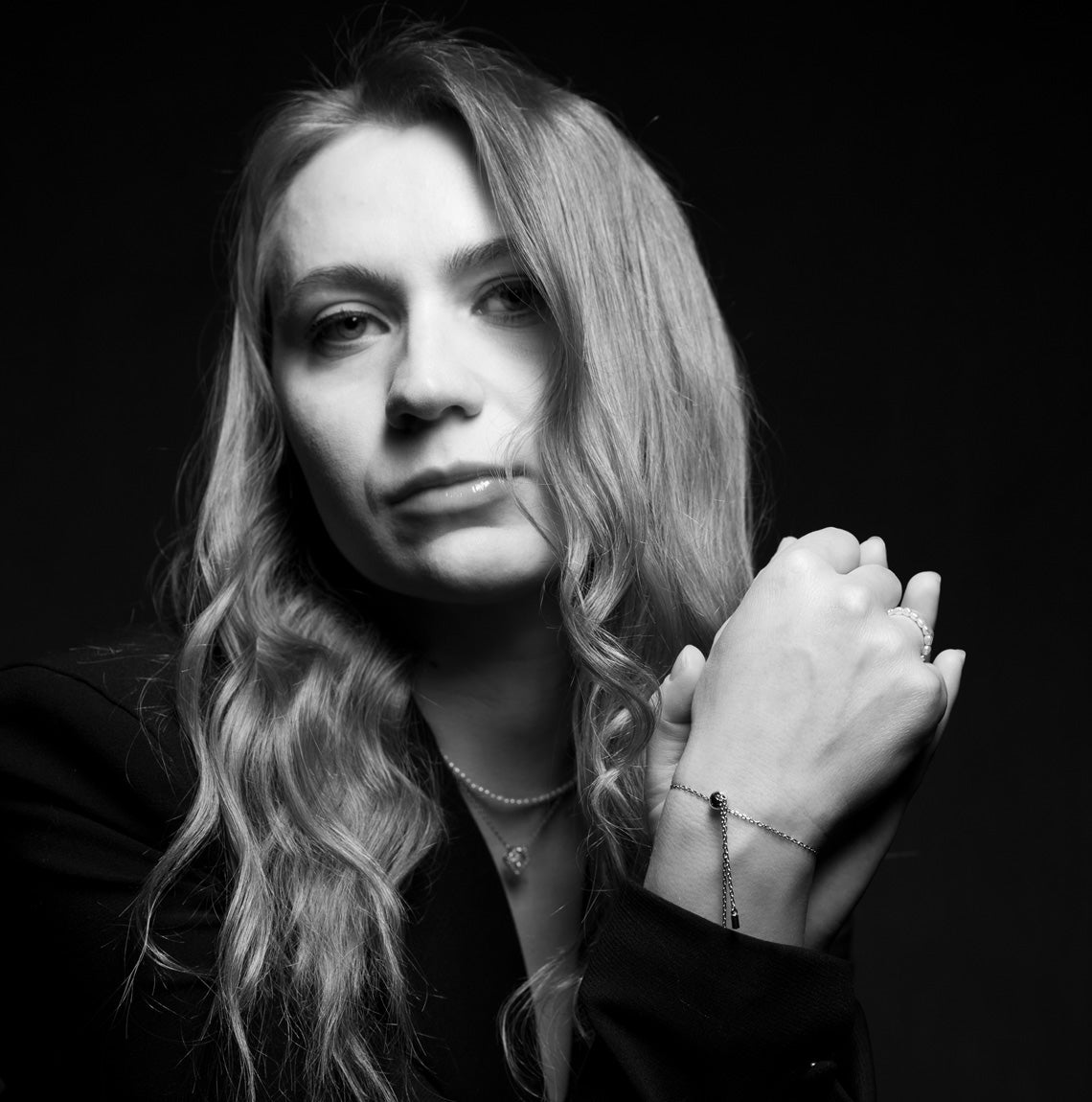
Olha Tsyliuryk
Bucha district, Ukraine
Even across the world from her home in Ukraine, Olha Tsyliuryk works to sustain the community and university students she left behind. She serves as an elected district council member of the district council of Bucha, an area north of Kyiv and the site of massive Russian war atrocities. She also teaches legal ethics online through Kyiv National Economic University, where she is a PhD student.
Born into a farming family, Tsyliuryk became a lawyer to help her father navigate Ukraine’s cumbersome agricultural law. But, as her career grew, so too did her ability to serve others. Prior to the war, she acted as legal adviser to the mayor of the city of Enerhodar and had a private law practice.
She says successfully rebuilding Ukraine will require focus on the country’s roots — economic, cultural and literal. She plans to use her Pitt law degree to help usher in trade reforms to restore her country’s crop and livestock production.
Russia started the war to eradicate Ukrainian history and culture, but our heritage is centuries-old, rich and beautiful. After the war, we must restore our traditions and language and share them with the rest of the world. Ukrainians feel a deep connection to our land. I want to return as soon as possible.
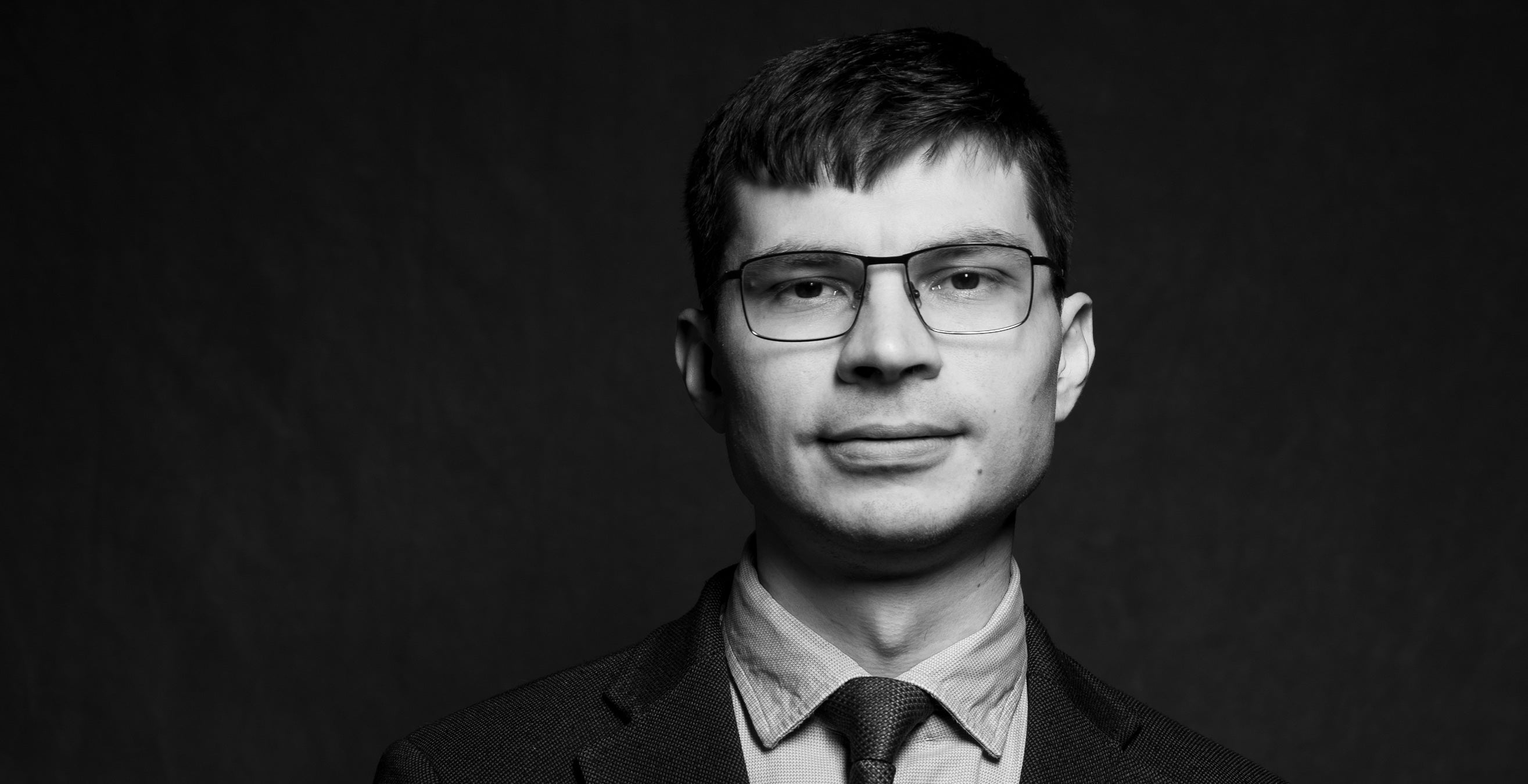
Tymur Mykhailov
Donetsk, Ukraine
In 2014, Tymur Mykhailov and his family relocated to Kyiv following the Russian army's occupation of his home city of Donetsk in Eastern Ukraine. In the country’s capital, he used his experience in litigation and white-collar criminal defense to build a new chapter of his legal career in anti-corruption and reform. He’s particularly proud of his role developing the illegal takeovers prevention strategy for the Ministry of Justice of Ukraine. He accomplished this jointly with a team from the Better Regulation Delivery Office, a leading Ukrainian think tank focused on protecting the public interest and bolstering protections in mergers and acquisitions.
He remains determined to champion justice in his home country. He says after earning an LLM degree from Pitt, he’s committed to doing what he calls “anti-Russian” legal work that benefits the interests of his country and fellow citizens, such as investment arbitration on behalf of Ukrainian investors and working to prevent Russia from evading sanctions.
By its resilience and force, my country has proven that it deserves to be a showcase of economic success and freedom.
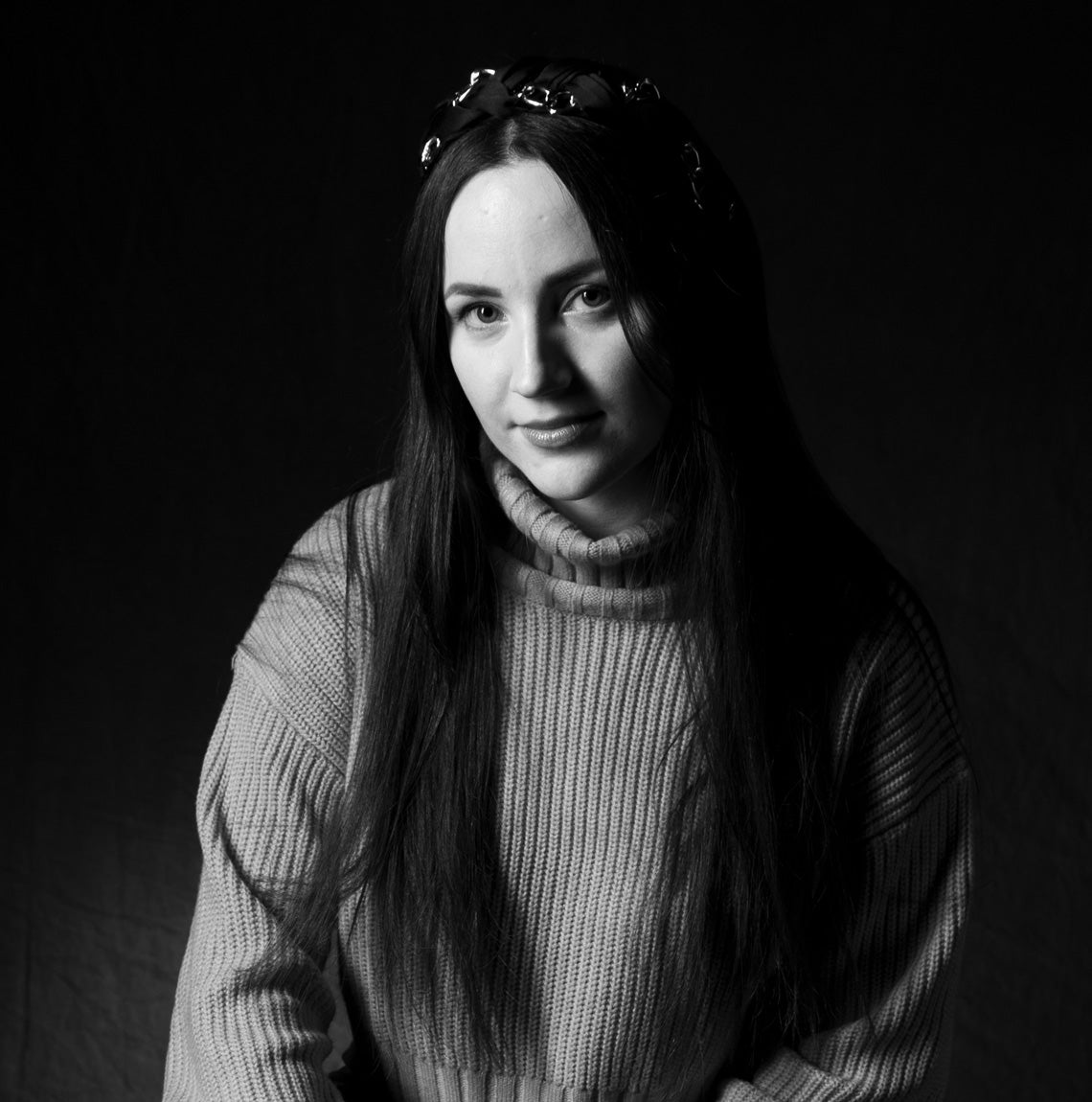
Anna Vnukova
Kyiv, Ukraine
An avid portraitist and musician, when Anna Vnukova decided to pursue a law career, she knew she wanted to specialize in an area connected to her passions. She zeroed in on intellectual property law, understanding the value of securing the integrity and authorship of creative work. She aimed to help Ukraine’s next generation of entrepreneurs and artists protect their work and thrive.
Now, Vnukova believes her work is more vital than ever to ensure that, when peace comes, Ukraine will be a safe place to do business.
At Pitt, she’s gaining skills in trademarking, patent registration and contract evaluation. As a former military translator, she is also focusing on the investigation and prosecution of war crimes.
She anticipates the need for Ukrainian lawyers versed in the American legal system to serve as a bridge between potential U.S. investors and her government’s tax and planning institutions. She wants to be ready to fill that need.
Rebuilding Ukraine post-war will involve ingenuity. Protecting intellectual property is a good start. When you have full and reliable protection, new companies feel safe to come and local inventors are confident to create more. If the intellectual property protection system functions well, businesses can grow, earn more, create new jobs and raise the standard of living. Effective intellectual property protection leads to bigger benefits for all individuals and, ultimately, to better infrastructure, prosperity and a more confident future.
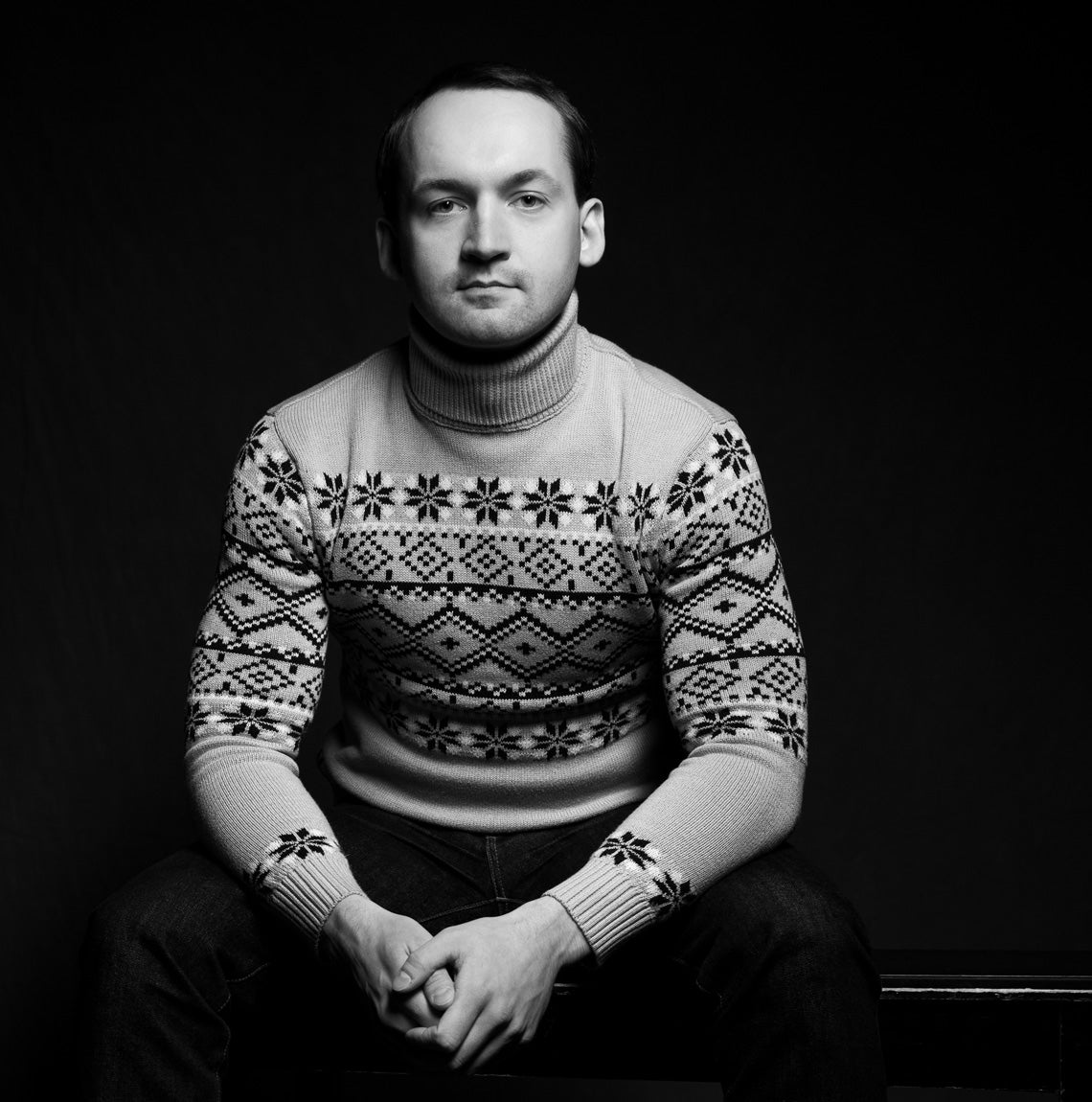
Oleh Kornat
Lviv, Ukraine
In March 2022, following Russia’s invasion of his country, Oleh Kornat, a finance lawyer, traded in his desk job to report on the war for Jurist, the digital legal news service headquartered at Pitt’s School of Law. He issued dispatches on a nearly daily basis, detailing the transformation of Ukraine’s cities into battlefields.
Kornat — the grandchild of World War II resistance fighters who fought Nazi and Soviet soldiers — also volunteered for an ad hoc civilian division that prepared for Russia’s potential westward advance by teaching military basics. He also worked to support the influx of Ukrainians fleeing the eastern part of the country.
At Pitt, he’s furthering his legal education to continue fighting for his country through the legal system.
Studying in the U.S. is a form of resistance against Russia. I believe everyone should do the job they are good at. Soldiers fight on the battlefield, teachers teach kids at schools and lawyers fight for justice in courts.

Anastasiia Rozvadovska
Kyiv, Ukraine
The youngest of the Rule of Law fellowship cohort, 21-year-old Anastasiia Rozvadovska, was finishing her final year of a bachelor’s degree in economic law of the European Union when the full-scale invasion of Ukraine began. Rozvadovska relocated to Germany, where she completed her college coursework online, interned with an American law firm and helped process immigration and temporary protection status documentation for Ukrainians.
Before fleeing Ukraine, however, Rozvadovska worked part-time for the Business Ombudsman Council, an independent advisory body of the Cabinet of Ministers of Ukraine, assisting in investigations and tackling taxation discrepancies. With the advanced law education she’s pursing at Pitt, she says she’s gaining the expertise to return to her home country to make a difference. She wants to aid in post-war reconstruction and fight the corruption that challenged law and order in Ukraine prior to the war.
We will need post-war reconstruction investments in Ukraine, but they will not come if investors are afraid of bribes and an unstable business climate. So, Ukraine is working now to defeat [corruption] and I want to be a part of it. For my generation, keeping Ukraine independent and strong is very important.
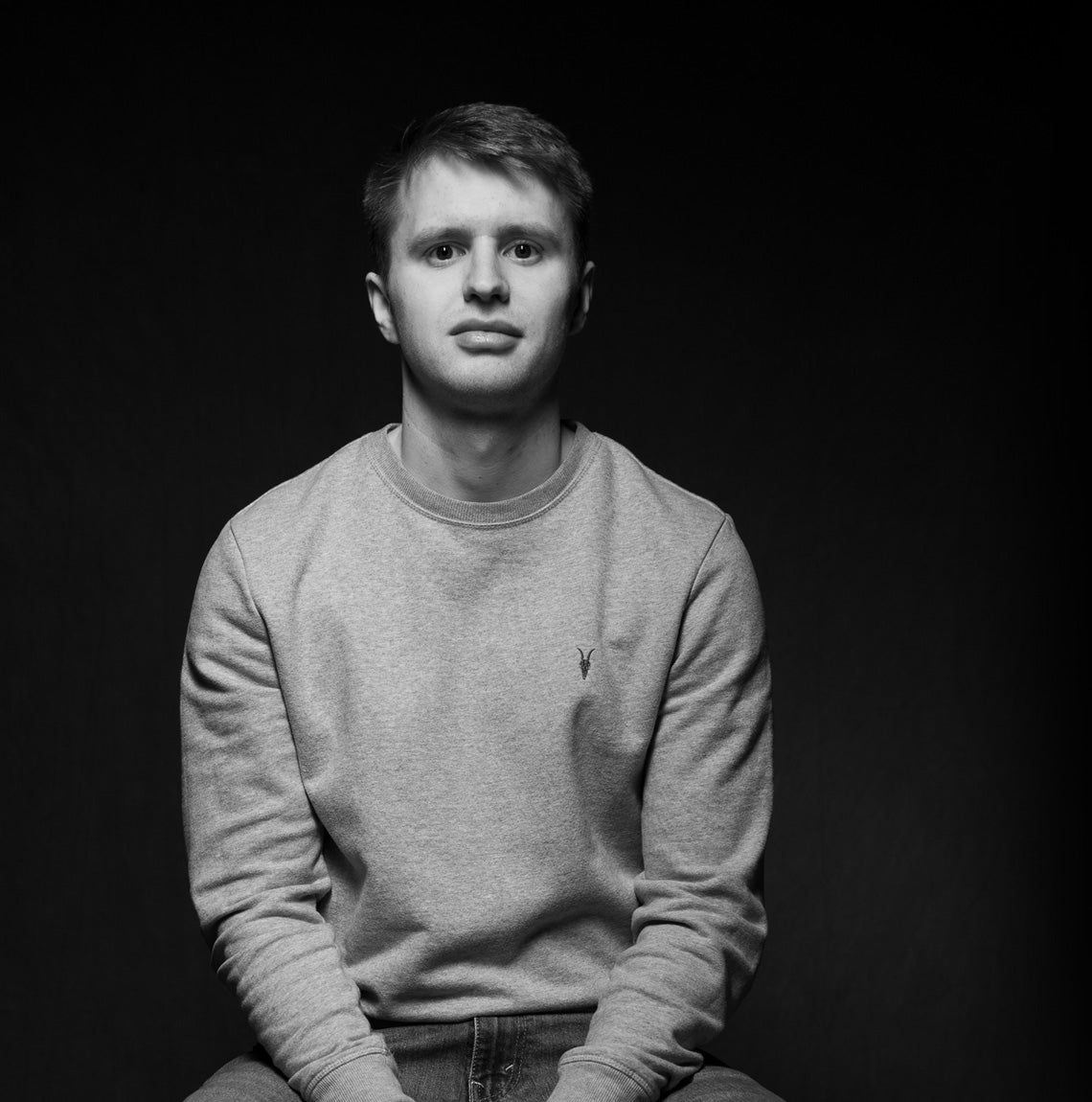
Yaroslav Petrenko
Kyiv, Ukraine
As a dispute resolution lawyer working for one of Ukraine’s largest law firms before the war, Yaroslav Petrenko spent many hours arguing cases in Ukrainian courts. He also witnessed firsthand the institution's limitations, including judges’ formalistic, biased and sometimes unfair approach to justice, coupled with the often protracted process for a case to make its way through the courts.
Still, he has great hope for his country.
At Pitt, in addition to focusing on international arbitration, Petrenko is gaining valuable experience in U.S. law. It’s a system he thinks can serve as a model for improving Ukraine’s judiciary system, helping to rebuild the country into a more just place.
Ukraine’s justice system is 30 years old — relatively new by many standards. Our Supreme Court serves us well, and I know with reform, so can the appellate and trial courts.
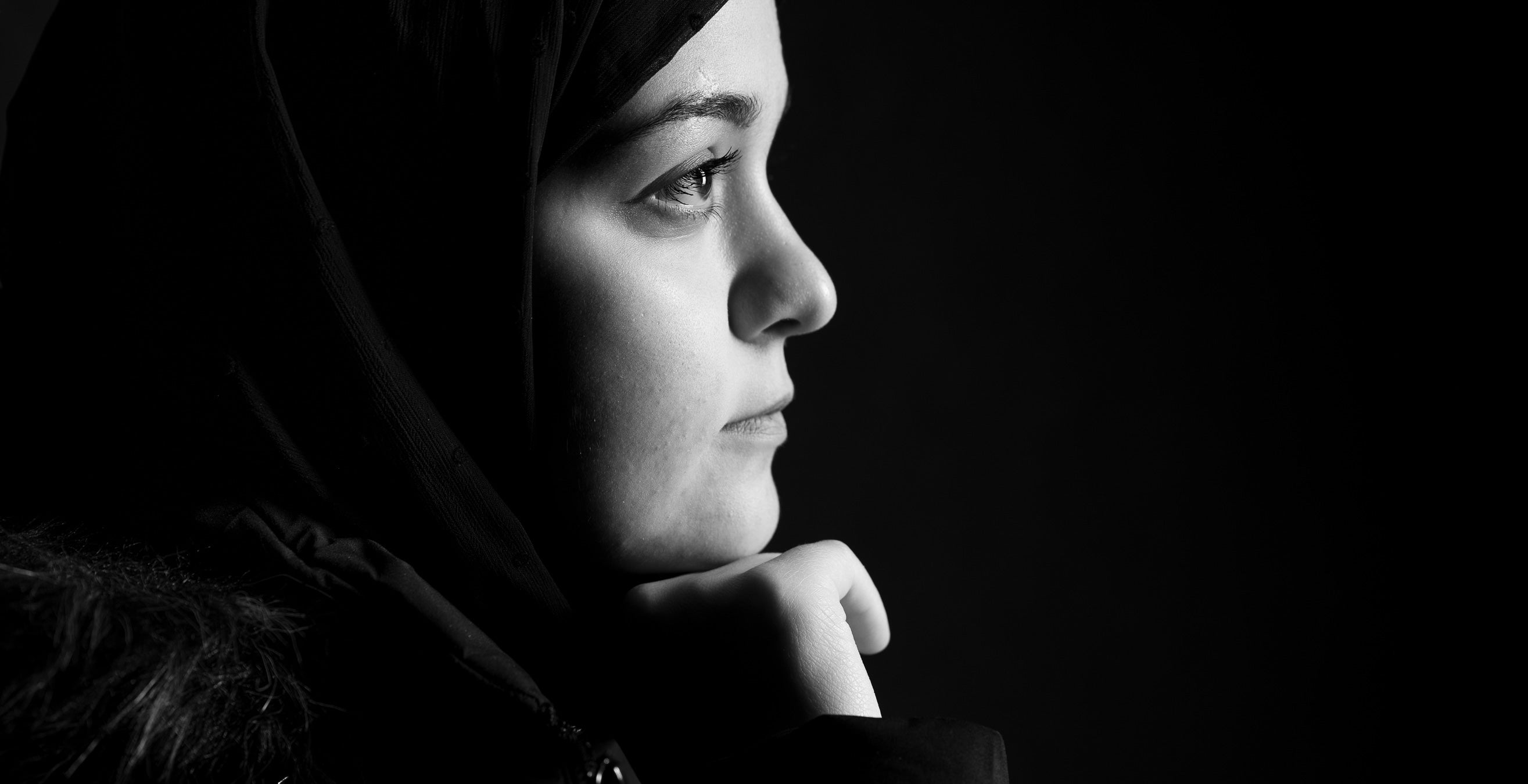
Maryam Jami
Herat, Afghanistan
Already a noted human rights advocate at 24 years old, Maryam Jami looks homeward for inspiration. Her mother completed medical school while she and her sister were toddlers, and her example motivated Jami to advocate for Afghan women from a young age.
She’s volunteered with multiple human rights programs, including UN Women, a gender equality and empowerment United Nations initiative, and recently founded her own organization, Fem for Rights, a nonprofit committed to supporting the next generation of Afghanistan’s female lawyers.
Jami was working as an attorney and applying for scholarships to study law in the United States when the Taliban regained power in 2021. She feared her dream of advocating for women’s rights on the international stage was out of reach. But as a Rule of Law fellow at Pitt, Jami has been able to continue her law education and her scholarship. She now aims to earn an advisory position at the United Nations and to continue championing human rights initiatives — work that would allow her to continue serving her nation’s people.
I really want to promote this culture of doing something for the core value it represents. My life goal is to promote volunteerism on behalf of human rights. It’s a civic duty. And in Afghanistan, we really need women, especially [those] who are working or will be working in this sector.
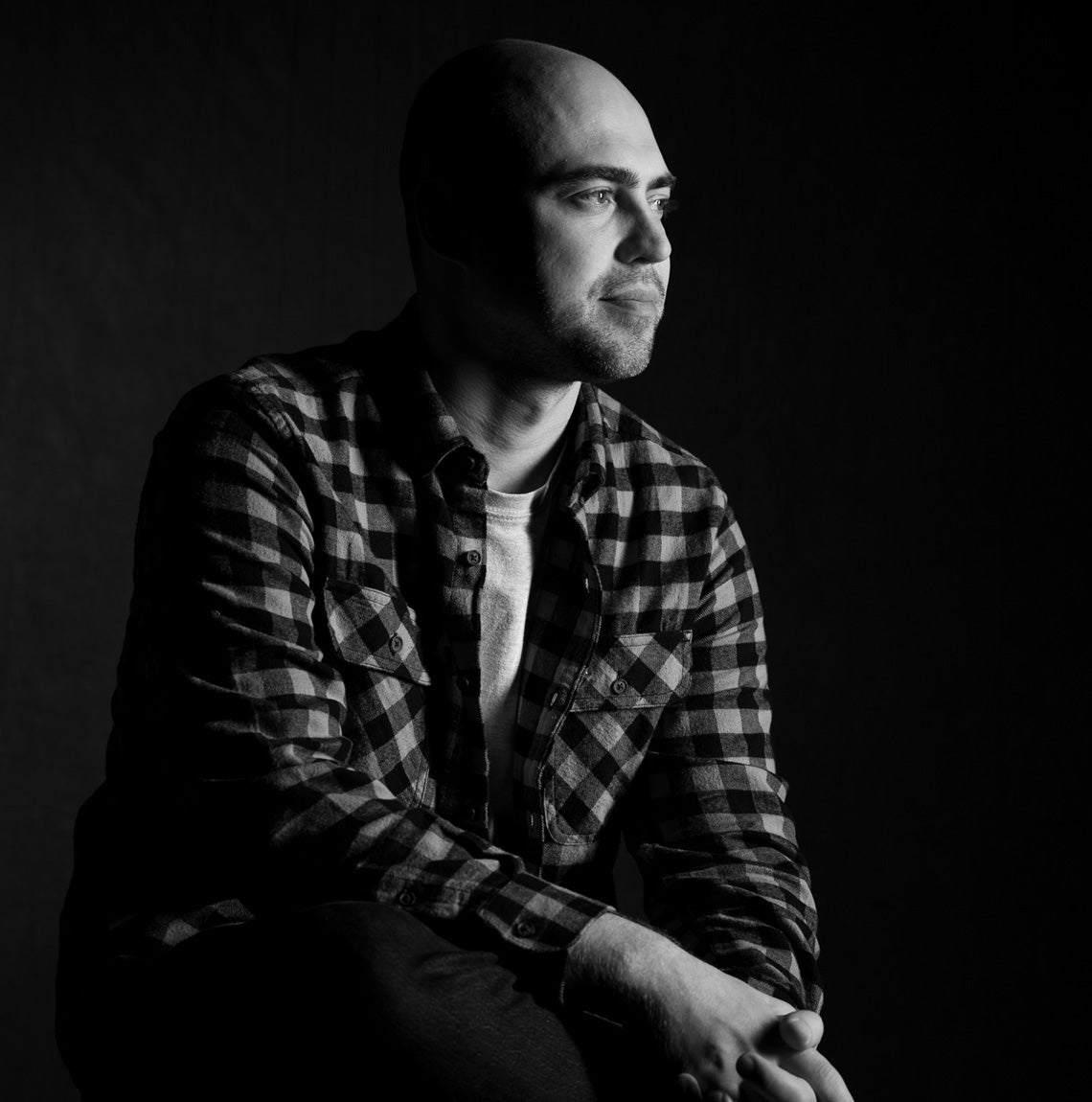
Andrii Kokhan
Kyiv, Ukraine
As a young person, Andrii Kokhan witnessed firsthand the economic devastation left in the wake of the Soviet Union’s collapse. The crisis led to unemployment that affected millions of Ukrainians, including Kokhan’s family. In 2023, following Russia’s invasion, Ukraine’s economy faces new and widespread challenges. Ukrainians have lost their homes, communities and infrastructure, says Kokhan. He’s motivated to help his country once again rebuild.
A lawyer formerly specializing various fields, including construction law, Kokhan was first accepted to study at Pitt’s CILE in 2020 but deferred his admission. Now, he says, the war in Ukraine has reinforced his reasons for pursuing advanced law studies at Pitt. With his degree, he’ll be better equipped to work with foreign investors in his home country and manage international business projects, particularly in construction — skills he hopes will help as Ukraine works to rebuild.
Studying law with people from other continents, belonging to different backgrounds, enriches my experience at Pitt and prepares me to better practice law across cultures. Foreign investments are essential to helping Ukrainians rebuild, and I hope our international partnerships will help make our cities more comfortable and inclusive for the people who live there.
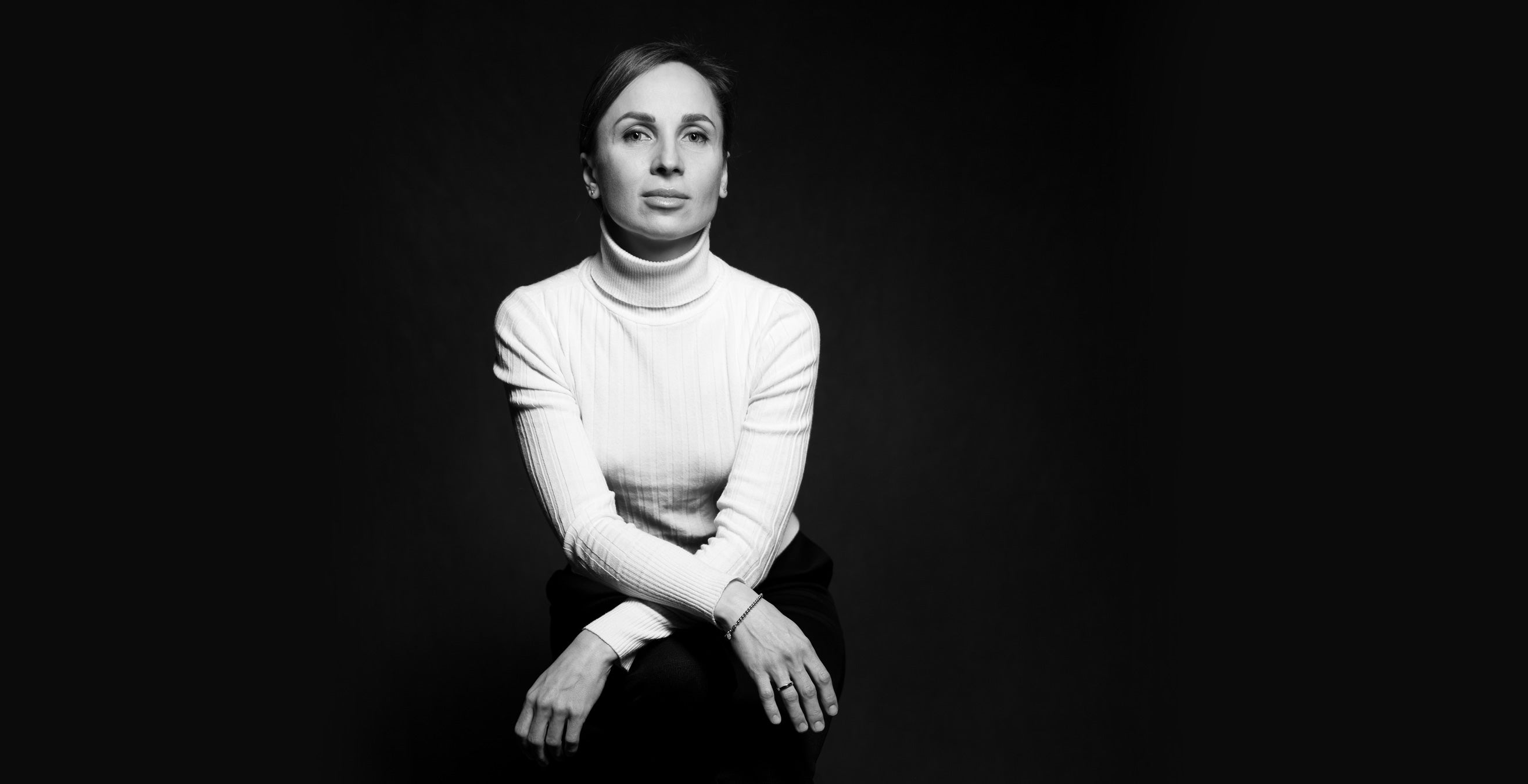
Tetiana Borysenko
Kyiv, Ukraine
Almost 20 years ago, Tetiana Borysenko attended a summer program on international business law taught by Pitt Law professors at Ukraine’s Donetsk National University. That’s where she met Ronald Brand, the founding director of the CILE, along with a Pitt Law student Nicole Breland, who became a lifelong friend. Soon after, Borysenko attended an international moot court exercise in Vienna, Austria. It was an opportunity to network with international law professionals and continue her work and connections with Pitt Law. While there, Brand gave her a small souvenir: an ink pen emblazoned with the University of Pittsburgh’s seal.
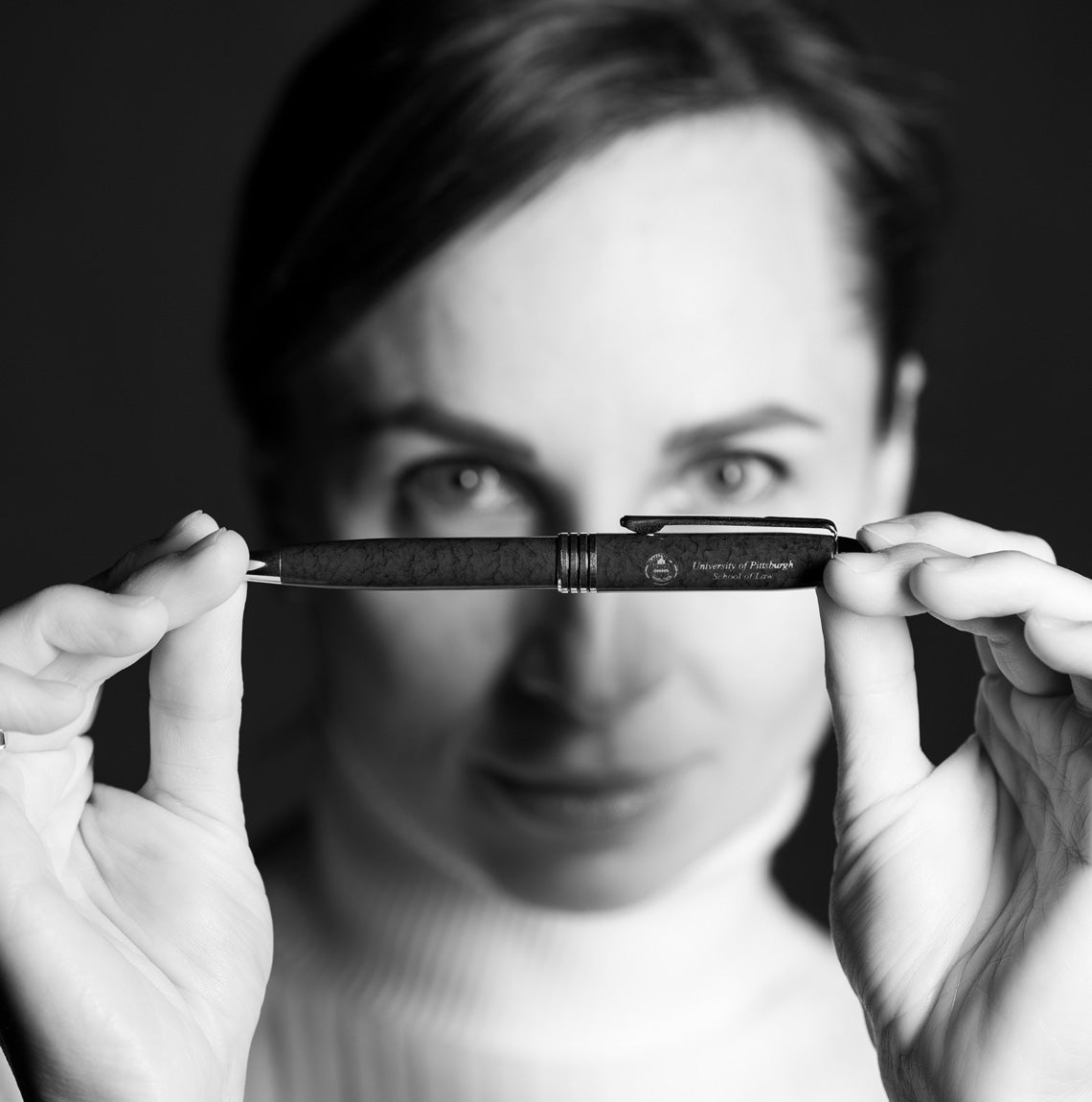 She held onto the pen — and the information about Pitt Law. Even as she became a successful lawyer in Kyiv, she dreamed of coming to Pittsburgh to study international business law. It became her North Star.
She held onto the pen — and the information about Pitt Law. Even as she became a successful lawyer in Kyiv, she dreamed of coming to Pittsburgh to study international business law. It became her North Star.
When war came to Ukraine, Borysenko fled west with her family and applied to the Rule of Law Fellowship program. Now, she’s studying international business transactions, commercial arbitration and other areas of the law with the hope of returning to Ukraine to help strengthen the justice system as the country rebuilds.
The Pitt pen, which she has kept all these years, miraculously still writes.
Before the war, I had a home, a job — a life that I loved. By getting an LLM, I have options, a way to make a living and build a future for my family and me.
This story was published on February 8, 2023. It is part of Pitt Magazine's Winter '23 issue.

